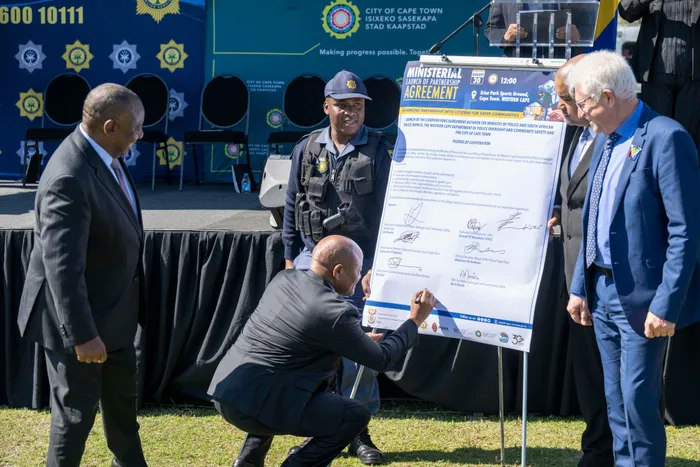Behind the Numbers: Western Cape Crime Pandemic Is a Crisis of Underdevelopment

President Cyril Ramaphosa (left) and Western Cape Premier Alan Winde (right) witnesses Police Minister Senzo Mchunu signing the Cooperation Agreement to Combat Crime during a ceremony at Erica Park Sports Ground in Belhar, Cape Town.
Image: Henk Kruger / Independent Newspapers
Benson Ngqentsu
On Monday 25 May 2025, the Western Cape’s Provincial Commissioner advocate Patekile released the crime report for the fourth quarter of 2024/25 following the national public release of the national crime report. Despite the reality that in the Western Cape, the levels of crime are a reflection of the crisis of chronic underdevelopment, the efforts of the police should be commended given some degree of reduction in certain categories of crime such as the murder rate.
However, in an attempt to appease international capitalist market forces, some sections of the bourgeoisie media characterised the crime reduction as significant. It is evident that the bourgeois media has once again spun a deceptive tale, one that serves the interests of international capitalist market forces while ignoring the brutal reality working-class communities endure daily.
They package crime stats as "progress", when in fact, the lived experience of the working class tells a far more painful story. Violence, poverty, and lawlessness are still entrenched in Black working-class communities, and they are no coincidence as Rupert also admitted, suggesting that the DA-run Western Cape is a crime-ridden province.
My analysis remains as urgent and correct as ever, thus, I maintain the argument that crime in the Western Cape, and particularly in Cape Town, is not just a policing issue. It is the direct product of the deep-rooted, systemic crisis of chronic underdevelopment, unemployment, landlessness, squatter camps, hunger, and hopelessness; these factors serve as breeding grounds for crime in the Western Cape.
The DA’s obsession with market forces and their blatant neglect of the Black working-class communities has created what we coin a tale of two cities, one safe and privileged, on the one hand, and the other hand, violence and abandonment. Evidence suggests that the crime report of the fourth quarter reveals that the Western Cape dominates nearly every major crime category and features in 98% of the national Top 30 police stations.
This is not progress, it’s a crisis. The Western Cape features major crime categories such as sexual offences, rape, assault GBH, murder, attempted murder, carjacking, illegal firearms, drugs, robbery, the list goes on and on. These crimes do not take place where the rich and the elite stay, but in working-class communities.
Furthermore, on drug-related cases alone, 23 of the top 30 police stations are in this province. These are working-class communities under siege, abandoned by a system designed to protect the privileged few.
Against this background, I argue that the crisis of crime in the Western Cape is not just a policing failure, it is a political and economic indictment of the DA’s neoliberal project. The violence in working-class communities is the direct result of colonial land dispossession, apartheid spatial planning, and today’s DA-led market-driven governance that prioritises profits over people.
Finally, the DA must stop patching wounds and deflection thinking that the devolution of police powers to the province will serve as a panado to address crime, the DA-led government must start addressing the root causes of crime in the Western Cape. Essentially, this means abandoning the DA’s failed neoliberal trajectory and embarking on a bold agenda of transformation, one that tackles unemployment, poverty, inequality, and spatial injustice head-on.
Until then, no amount of polished statistics or bourgeoise media spin will change the truth!!
Let us face it, the Western Cape is in crisis, and it’s the working class who pay the price.
* Benson Ngqentsu is the SACP’s Provincial Secretary, ANC-headed Alliance Caucus for Police Oversight and Community Safety. This is an edited version of his statement delivered in the Provincial legislature on May 29, 2025.
** The views expressed do not necessarily reflect the views of IOL, Independent Media or The African.